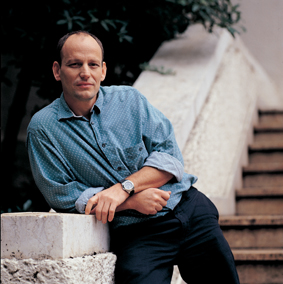Right from the beginning, life is all about choices. The decision to proceed down one path eliminates the possibility of taking others, and consequences can be lifelong.
Cells in a developing embryo must make such critical, final decisions. The thousands of different tissues that make up the body are all derived from one original cell type, and in the earliest stages of development the possibilities are wide open. A cell can decide to become any part of the body, such as heart or bone. But cells do not take the decision-making process lightly. A complex orchestration of events underlies each choice, and these “defining moments” are as yet poorly understood. Mistakes can cause innumerable problems, and if we understood how cells determine their fate during embryonic development, we could perhaps guide them to make better decisions.
Dr. Eldad Tzahor of the Biological Regulation Department heads a team of researchers working to identify the series of events occurring during normal embryo development that leads to the formation of heart or skeletal muscle tissue. Among the lab’s sophisticated equipment is a standard white refrigerator full of farm-fresh fertilized eggs. At early stages of development, all vertebrate embryos, from alligators to humans, share remarkable similarities, so the chick embryo, with its short gestation period and easy accessibility, is an ideal model to study developmental biology.
Tzahor and members of his group are able to isolate so-called progenitor cells from a developing chick embryo and follow their development and differentiation into the various types of tissue. “When I started my research in this field, I tried to isolate cells that should normally develop into skeletal muscle. To my surprise, I saw beating heart cells in the culture dish. Suddenly we realized that the textbook definition of the developmental fate of a certain type of cell was no longer black and white but fairly gray,” says Tzahor. His research revealed a cell’s destiny is not only fate: there’s also an element of choice. The decision depends, in part, on its developmental context: its stage in development, the signals it receives from its neighboring cells and the sequence in which those signals are exchanged. Thus a cell’s proximity to other types of cells at critical stages in its development guides its developmental choices.
Tzahor unraveled some of the mystery of the decision-making process by identifying the role of a group of protein molecules called Wnt in managing cell fate decisions. Wnt are signaling molecules that instruct cells not to form a particular cell type - heart, for instance - causing them to follow a different path. Tzahor and his research team are now pursuing the identification and classification of other “general managers” of the differentiation program of embryonic heart cells. Their findings could be an important key to future progress in stem cell research seeking to generate specialized cell types for organ or tissue repair.
“Cells have to walk and talk together to make decisions that lead to their ultimately separate developmental paths,” says Tzahor. “The molecular crosstalk between cells leads to a perfect orchestration of events that results in the creation of our bodies, but it's in a language that we don't yet understand. Despite the wealth of information we have in the textbooks, the deeper, real-life dynamics of embryonic development are much more complicated.”
From Farm fields to Research Fields
Growing up on a kibbutz has its advantages: From a young age Tzahor made observations about the cycles of life. His childhood experiences and early interest in veterinary biology help explain why a successful career scientist changed paths to pursue embryonic development research. Tzahor says this career shift has been crucial to his development as a scientist, enabling him to apply and inject new themes and perspectives across a range of fields.
In 1988, Tzahor completed a Ph.D. in the Weizmann Institute's Molecular Cell Biology Department under Prof. Yosef Yarden. Following a postdoctoral fellowship at Harvard Medical School in boston, he returned to the Institute as a senior scientist in the biological Regulation Department in 2003.
Tzahor is married to Talia and the father of Noam (9) and Roy (4).
Dr. Eldad Tzahor’s research is supported by the Estelle Funk Foundation and Mr. and Mrs. Charles Stephens, Somers, NY. Dr. Tzahor is the incumbent of the Philip and Gertrude Nollman Career Development Chair.
